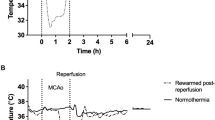Summary
During brain ischemia temperature spontaneously declines. In animal experiments this decline is frequently prevented by stabilizing the temperature at the pre-ischemic level, using an external heat source. The present study examines whether this procedure influences the severity of ischemic injury. Wistar rats were submitted to 30-min four-vessel occlusion followed by 7 days recirculation. During ischemia and the 1st h of recirculation various systemic and electrophysiological variables were recorded. Seven days after the ischemia brains were perfusion-fixed for light microscopical examination. Three brain temperature profiles were compared: spontaneous decline of brain temperature during ischemia from 36° to 31°C (spontaneous hypothermia; n=5); constant brain temperature of 30°C induced by selective head cooling (induced hypothermia; n=5); and constant brain temperature of 36°C induced by selective head heating (normothermia; n=5). Core temperature was maintained constant at 37°C in all groups. In spontaneous hypothermia, 19% of CA1 neurons survived after 30-min ischemia. Induced hypothermia significantly increased this percentage to 69% (P<0.05); maintenance of brain temperature at normothermia decreased neuronal survival to 1%. Normothermia also led to morphological injury outside the vulnerable regions, an increase in mortality, marked loss of body weight and a prolongation of the electroencephalographic suppression. These findings demonstrate that stabilizing brain temperature at a constant normothermic level by an external heart source introduces an aggravating pathological element that may interfere in an unpredictable way with the manifestation or treatment of ischemic injury.
Similar content being viewed by others
References
Buchan A, Pulsinelli WA (1990) Hypothermia but not the N-methyl-d-aspartate antagonist, MK-801, attenuates neuronal damage in gerbils subjected to transient global ischemia. J Neurosci 10:311–316
Busto R, Dietrich WD, Globus MY-T, Valdes I, Scheinberg P, Ginsberg MD (1987) Small differences in intraischemic brain temperature critically determine the extent of ischemic neuronal injury. J Cereb Blood Flow Metab 7:729–738
Busto R, Globus MY-T, Dietrich WD, Martinez E, Valdés I, Ginsberg MD (1989) Effect of mild hypothermia on ischemia-induced release of neurotransmitters and free fatty acids in rat brain. Stroke 20:904–910
Cardell M, Boris-Möller F, Wieloch T (1991) Hypothermia prevents the ischemia-induced translocation and inhibition of protein kinase C in the rat striatum. J Neurochem 57:1814–1817
Chopp M, Knight R, Tidwell CD, Helpern JA, Brown E, Welch KMA (1989) The metabolic effects of mild hypothermia on global cerebral ischemia and recirculation in the cat: comparison to normothermia and hyperthermia. J Cereb Blood Flow Metab 9:141–148
Corbett D, Evans S, Thomas C, Wang D, Jonas RA (1990) MK-801 reduced cerebral ischemic injury by inducing hypothermia. Brain Res 514:300–304
Dietrich WD, Busto R, Halley M, Valdes I (1990) The importance of brain temperature in alterations of the blood-brain barrier following cerebral ischemia. J Neuropathol Exp Neurol 49:486–497
Dietrich WD, Busto R, Valdes I, Loor Y (1990) Effects of normothermic versus mild hyperthermic forebrain ischemia in rats. Stroke 21:1318–1325
Dietrich WD, Halley M, Valdes I, Busto R (1991) Interrelationships between increased vascular permeability and acute neuronal damage following temperature-controlled brain ischemia in rats. Acta Neuropathol 81:615–625
Hägerdal M, Harp J, Siesjö BK (1975) Effect of hypothermia upon organic phosphates, glycolytic metabolites, citric acid cycle intermediates and associated amino acids in rat cerebral cortex. J Neurochem 24:743–748
Hirsch H, Müller HA (1962) Funktionelle und histologische Veränderungen des Kaninchengehirns nach kompletter Gehirnischämie. Pflügers Arch Gesamte Physiol 275:277–291
Hossmann K-A, Kleihues P (1973) Reversibility of ischemic brain damage. Arch Neurol 29:375–384
Kuroiwa T, Bonnekoh P, Hossmann K-A (1990) Prevention of post-ischemic hyperthermia prevents ischemic injury of CA-1 neurons in gerbils. J Cereb Blood Flow Metab 10:550–556
Minamisawa H, Nordstrom CH, Smith ML, Siesjö BK (1990) The influence of mild body and brain hypothermia on ischemic brain damage. J Cereb Blood Flow Metab 10:365–374
Minamisawa H, Smith ML, Siesjö BK (1990) The effect of mild hyperthermia and hypothermia on brain damage following, 5, 10, and 15 minutes of forebrain ischemia. Ann Neurol 28:26–33
Mitani A, Kadoya F, Kataoka K (1991) Temperature dependence of hypoxia-induced calcium accumulation in gerbil hippocampal slices. Brain Res 562:159–163
Miyazawa T, Hossmann K-A (1992) Methodological requirements for accurate measurements of brain body temperature during global forebrain ischemia of rat. J Cereb Blood Flow Metab 12:817–822
Plum F, Posner JB, Alvord EC (1963) Edema and necrosis in experimental cerebral infarction. Arch Neurol 9:563–570
Pulsinelli WA, Brierley JB (1979) A new model of bilateral hemispheric ischemia in the unanesthetized rat. Stroke 10:267–272
Schmidt-Kastner R, Paschen W, Hossmann K-A (1989) A modified four-vessel occlusion model for inducing incomplete forebrain ischemia in rats. J Cereb Blood Flow Metab 20:938–946
Welsh FA, Sims RE, Harris VA (1990) Mild hypothermia prevents ischemic injury in gerbil hippocampus. J Cereb Blood Flow Metab 10:557–563
Author information
Authors and Affiliations
Rights and permissions
About this article
Cite this article
Miyazawa, T., Bonnekoh, P., Widmann, R. et al. Heating of the brain to maintain normothermia during ischemia aggravates brain injury in the rat. Acta Neuropathol 85, 488–494 (1993). https://doi.org/10.1007/BF00230487
Received:
Revised:
Accepted:
Issue Date:
DOI: https://doi.org/10.1007/BF00230487




